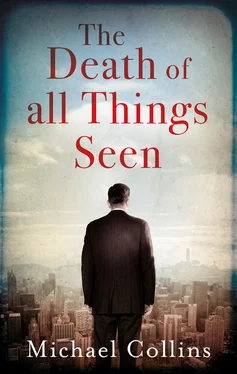Frank was eventually stabbed and died in a Toronto hospital.
She revealed the story, working a fire that Nate couldn’t start. There was a trick, the bedding of embers had to be packed with sawdust dipped in a gel paraffin, which, when she lit it, gave off a bright blue light like the star of first creation. Nate was taken by the flint of light caught in her eyes, the light licking the sheen of her cleavage and up under her chin as she turned and faced him.
*
By seven thirty, after a day and night of snow, Nate eased toward the outskirts of Windsor. Almost thirty-eight years had passed since he had crossed the border at Sault Ste. Marie as a desperate nineteen-year-old.
If felt like a lifetime ago. Ursula was dead almost eight years, her radiant face still the trademark design of the organics enterprise he had sold the year after she succumbed to cancer. He had sketched her face up by Handsome Lake in the first year of their marriage.
He didn’t go out of his way to tell those who didn’t know the story of the origin of the company logo when it might have increased the sale price of the business. Nor did he reveal his own personal story, his Vietnam history and exile that, equally, might have lowered the price. His voice had leveled, with a broadening of his vowels, so he sounded Canadian without consciously trying. He sounded like a man without a history.
In approaching the border crossing, he could see how the divide between America and Canada had diminished in the push of global sameness, the eastern Canadian cities running along the border filled with the same big box stores — the Walmarts and Lowes and Sears and Targets — the same fast food franchises, the same car manufacturers. These Canadian cities now inhabiting just a slightly altered version of the American experience, a reprise of the American experiment overlaid with a sense of decency and socialist tendencies, though it was all becoming a oneness, so there was no real understanding of a divergent past, or it didn’t much matter anymore.
He considered calling his only daughter. They had not talked in a great while. Against his and her mother’s wishes, she had married a Pakistani immigrant, Rahim Hafeez, who had gone on to great success with a controlling interest in a call center in Karachi, and whose view of English Imperialism was exceedingly gracious.
Disconcertingly, Rahim had made his daughter dress according to a conservative Muslim code, while he dressed like any one of the terrorists who had hijacked and crashed the planes into the Twin Towers — in button-down shirts, Levi jeans, Nikes, and a Blue Jays baseball cap. It was a fight Nate knew best to put off for another time. Perhaps he would visit, but not just then.
In truth, Nate’s mind was elsewhere. He had found Norman Price’s email address on a theater website. He might contact him, making polite reference that he was returning to Chicago.
In fact, he knew he would contact him. It was decided in his heart, though it would be a delicate matter, how to broach the subject of Helen Price, but for now there was the advancing line of cars ahead of him, and America awaiting his return.
JOANNE ENTERED NORMAN’S office, asking casually, ‘What are you working on?’ as she handed him a mug of coffee.
He looked up with a determined seriousness shot through with a good-natured roll of his eyes. ‘A grand theory of relativity that will account for everything we have ever felt or experienced.’
‘And it’s coming along well, I trust?’
Norman took the mug, ‘Not really…’
Joanne smiled. ‘Well, there’s always tomorrow!’
In so saying it, Norman understood the impasse of his life and work was of no great significance. He was arriving at the point of awareness that, if he never found greatness, it wouldn’t matter, not to the larger world, or to Joanne. It was small comfort, but true, and then Joanne was leaning on Norman’s shoulder, staring at the wavering feed of the realty site.
Norman said preemptively, ‘It’s a house I inherited.’ He qualified the remark, ‘My parents’ house.’ He stopped. Explaining his parents’ recent deaths, which he hadn’t done, would have only revealed a deeper hurt that there were secrets yet kept from her. Then he thought better of it, and mentioned Walter and Helen by name.
An airy quality was gone from Joanne’s voice. Taking a step back, she said flatly, ‘You’re putting it on the market or keeping it?’
Norman hesitated. ‘There’s no liquidity in the markets now. You’ve listened to the congressional hearings.’ It wasn’t an answer.
Joanne cleared her throat. ‘Were you ever going to bring it up?’ Her eyes glossed, her gaze moving from the screen to the white board. She looked at the stick figure of herself, along with the rendering of the Craigslist heirloom table, and at the center of the formula the stick figure of Norman ( N )  . Arrows connected Norman to Grace in the bathtub, to Joanne, Grace and Randolph’s departure each day for The Walk ( w ), his stick figure with an exponential joy quotient ( j ) X at their receding image.
. Arrows connected Norman to Grace in the bathtub, to Joanne, Grace and Randolph’s departure each day for The Walk ( w ), his stick figure with an exponential joy quotient ( j ) X at their receding image.
Joanne said, ‘Can I be honest with you?’ as if it was hard containing what she felt. Her eyes met Norman’s. ‘It’s about your work.’ Her eyes were on the board again, and then on him.
Norman went to reach for Joanne’s hand but she pulled away. Her voice rose. ‘I went to one of your shows once with Peter. He knew all about you. We ended up seeing Latchkey Kid, and what I honestly felt while watching it was that your work lacked humanity.’
Norman tried to breathe quietly.
Joanne kept talking. She would not be dissuaded from discontinuing. Lines showed around her eyes. ‘The things you said about your parents… It wasn’t that I didn’t believe them, but there was no restraint. It was downright pathological.’ She turned to the board. ‘Sometimes restraint is what’s needed.’ She had begun and she would finish. This was not anger as much as truth speaking. Norman knew it.
‘Of course, Peter defended you. He said you were…’ She raised her fingers for the effect of quotation marks. ‘“Re-appropriating darkness, embracing a rarified pathology of male pessimism characteristic of the American theater of the forties and fifties .” ’
Norman forced a laugh. ‘You’re almost making me like Peter.’
Joanne turned on him. ‘I bet you would like him. Peter was always generous about the failure of others.’ She did the quotation marks thing again. ‘He said something like “there is exalted genius in facing a darkness too few try to confront anymore”.’
Joanne was staring directly at Norman. ‘Of course, he was talking about his own work as much as yours. And you know what I said to Peter when he finished with his explanation?’
Norman didn’t risk responding.
‘I said, “That’s all well and good. Norman Price might be a genius, but he’s also an asshole.”’
Norman flinched.
In the sudden silence, Randolph appeared. He needed to go.
Joanne went out with him, closing the door behind her so Norman heard the receding echo of her footfall on the cold tile.
*
In Joanne’s absence, Norman felt a trembling feeling of guilt. He understood his capacity to drive people out of his life — his parents, Kenneth, any number of men he had dated, and now Joanne. He went and faced Grace’s room and thought that whatever about adult life, about the injury one could inflict on another, Grace was different. She represented a permanence and hope. This he had against the world.
He wanted to suddenly reclaim her, to front her at the center of his existence, and yet, in observing her, in compelling himself to love her, he felt instead what he felt most times when he looked at her, an unsettling emptiness and lack of any genuine connection.
Читать дальше

 . Arrows connected Norman to Grace in the bathtub, to Joanne, Grace and Randolph’s departure each day for The Walk ( w ), his stick figure with an exponential joy quotient ( j ) X at their receding image.
. Arrows connected Norman to Grace in the bathtub, to Joanne, Grace and Randolph’s departure each day for The Walk ( w ), his stick figure with an exponential joy quotient ( j ) X at their receding image.










